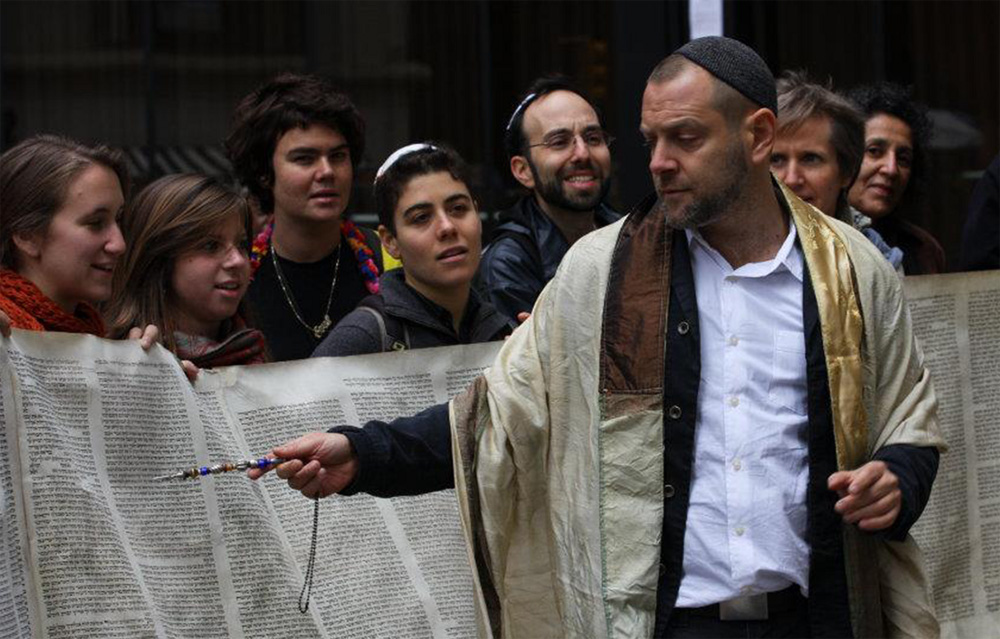In 2004, Amichai Lau-Lavie had a revelation as he attempted to reconcile the strain of Orthodox Judaism he grew up with, estimating that he comes from a bloodline of 38 consecutive generations of rabbis before him, and his identity as a gay man, living out and proud in New York where he was a staple of the nightlife where he’d perform in drag. As in most religions, Lau-Lavie found scripture to be open to interpretation and as he recounts in “Sabbath Queen,” there was a tradition in Jewish history of sharing religious text as a performance, leaving the room for artistic expression that could expand the meaning of what was originally written. The epiphany gave Lau-Lavie a certain level of inner peace and spurred him to start his own practice Lab/Shul, a pop-up synagogue with a “God-optional” policy that welcomed all comers, and it’s clear director Sandi DuBowski took similar inspiration to turn the rabbi’s soul searching into a real rollercoaster with all its twists and turns.
If it seems like Lau-Lavie is engaged in an eternal struggle when he continued to question his place in Judaism even as the organization he created endures, it also feels as if DuBowski needed every minute of the two decades he spent off and on with the him in order to make his monumental follow-up to his 2001 film “Trembling Before G-d.” After surveying a number of different people in that film with the same predicament as Lau-Lavie, still deeply invested in a religion that traditionally excluded them because of their sexuality, “Sabbath Queen” may revolve around only one subject, but it elegantly connects the many lives Lau-Lavie has cycled through, growing up as the son of a prominent rabbi and the nephew of an even more prominent one in Israel, having to flee to New York after being publicly outed and adopting a stage persona known as Hadassah Gross. As Lau-Lavie admits, the brassy broad with a thick Hungarian accent of strong Jewish faith organically emerged after “one vodka too many,” but the ability to slip into character offered catharsis and with great patience, DuBowski observes how it allowed for him to step into a role that never made any sense to him, joining the family business on his own terms.
Arriving in 2024, “Sabbath Queen” seems particularly timely in considering what it means to observe Judaism, a question that could really extend to any religion that has been seemingly overtaken by its most rigidly conservative members and as the film moves fluidly back and forth between from as early as 1997 on, DuBowski’s commitment to a longitudinal project pays off in presenting an answer is hardly static for those of true faith with unusual nuance. Editors Francisco Bello, Kyle Crichton, Philip Shane, and Jeremy Stulberg work wonders with a complicated, restless narrative in which historical context that you can actually witness for Lau-Lavie’s choices are constantly being folded in, from the family he was raised in and comparisons to his brother Benny, the model of an Orthodox rabbi, to finding his tribe in New York as a part of the club scene and later spiritual seekers without any natural home. Even after Lau-Lavie seems to have settled into some level of comfort, the film has an extra gear to pull when its subject has to decide what is an acceptable path forward for Lab/Shul and himself, which are occasionally at odds with each other and comes to a head when he looks to be ordained by the Jewish Theological Seminary of America, which would prevent him from performing the interfaith marriages that were a foundational element of the synagogue he started.
Bookends of a wedding make particular sense in “Sabbath Queen” when Lau-Lavie faces as many questions at the end of the film as he did at the beginning, but DuBowski affords his subject’s spiritual journey the epic quality it deserves where triumph is simply waking up at peace with where you are, recognizing all the places emotionally – and in Lau-Lavie’s case, geographically – you have to go to get there.
“Sabbath Queen” will screen again at the Tribeca Festival at the Village East on June 10th at 3 pm and June 14th at 2:30 pm.




